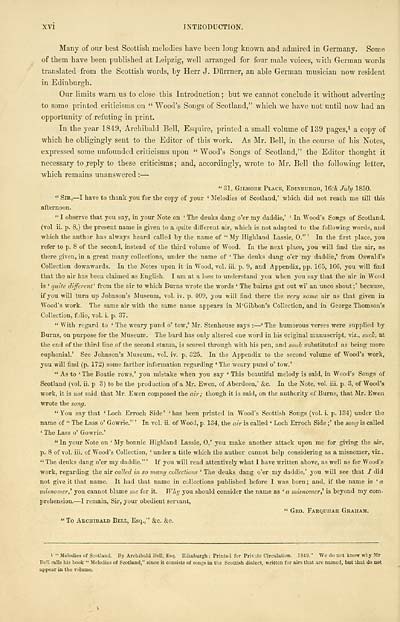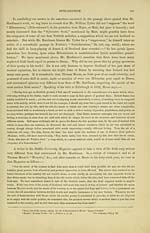Glen Collection of printed music > Printed music > Wood's edition of the songs of Scotland
(24) Page xvi
Download files
Complete book:
Individual page:
Thumbnail gallery: Grid view | List view

XVI INTKODUCTION.
Many of our best Scottish melodies have been long known and admired in Germany. Some
of them have been published at Leipzig, well arranged for four male voices, with German words
translated from the Scottish words, by Herr J. Dtirrner, an able German musician now resident
in Edinburgh.
Our limits warn us to close this Introduction ; but we cannot conclude it without adverting
to some printed criticisms on " Wood's Songs of Scotland," which we have not until now had an
opportunity of refuting in print.
In the year 1849, Archibald Bell, Esquire, printed a small volume of 139 pages, 1 a copy of
which he obligingly sent to the Editor of this work. As Mr. Bell, in the course of his Notes,
expressed some unfounded criticisms upon " Wood's Songs of Scotland," the Editor thought it
necessary to reply to these criticisms ; and, accordingly, wrote to Mr. Bell the following letter,
which remains unanswered : —
" 31, Gilmore Place, Edinburgh, 16,'7i July 1850.
" Sir, — I have to thank you for the copy of your ' Melodies of Scotland,' which did not reach me till this
afternoon.
" I observe that you say, in your Note on ' The deuks dang o'er my daddie,' ' In Wood's Songs of Scotland,
(vol ii. p. 8,) the present name is given to a quite different air, which is not adapted to the following words, and
which the author has always heard called by the name of " My Highland Lassie, 0." ' In the first place, you
refer to p. 8 of the second, instead of the third volume of Wood. In the next place, you will find the air, as
there given, in a great many collections, under the name of ' The deuks dang o'er my daddie,' from Oswald's
Collection downwards. In the Notes upon it in Wood, vol. iii. p. 9, and Appendix, pp. 165, 166, you will find
that the air has been claimed as English. I am at a loss to understand you when you say that the air in Wood
is ' quite different' from the air to which Burns wrote the words ' The bairns gat out wi' an unco shout ;' because,
if you will turn up Johnson's Museum, vol. iv. p. 409, you will find there the very same air as that given in
Wood's work. The same air with the same name appears in M 'Gibbon's Collection, and in George Thomson's
Collection, folio, vol. i. p. 37.
" With regard to ' The weary pund o' tow,' Mr. Stenhouse says : — ' The humorous verses were supplied by
Burns, on purpose for the Museum. The bard has only altered one word in his original manuscript, viz., suck, at
the end of the third line of the second stanza, is scored through with his pen, and souk substituted as being more
euphonial.' See Johnson's Museum, vol. iv. p. 325. In the Appendix to the second volume of Wood's work,
you will find (p. 172) some farther information regarding ' The weary pund o' tow.'
" As to ' The Boatie rows,' you mistake when you say ' This beautiful melody is said, in Wood's Songs of
Scotland (vol. ii. p 3) to be the production of a Mr. Ewen, of Aberdeen,' &c. In the Note, vol. iii. p. 3, of Wood's
work, it is not said that Mr. Ewen composed the air; though it is said, on the authority of Burns, that Mr. Ewen
wrote the song.
" You say that ' Loch Erroch Side' 'has been pi-inted in Wood's Scottish Songs (vol. i. p. 134) under the
name of " The Lnss o' Gowrie." ' In vol. ii. of Wood, p. 134, the air is called ' Loch Erroch Side ;' the sontj is called
' The Lass o' Gowrie.'
" In your Note on ' My bonnie Highland Lassie, 0,' you make another attack upon me for giving the air,
p. 8 of vol. iii. of Wood's Collection, ' under a title which the author cannot help considering as a misnomer, viz.,
"The deuks dang o'er my daddie."' If you will read attentively what I have written above, as well as for Wood's
work, regarding the air called in so many collections ' The deuks dang o'er my daddie,' you will see that I did
not give it that name. It had that name in collections published before I was born ; and, if the name is ' a
misnomer' you cannot blame me for it. Why you should consider the name as ' a misnomer,' is beyond my com-
prehension. — I remain, Sir, your obedient servant,
" Geo. Farquhar Graham.
"To Archibald Bell, Esq.," &c. &c.
i " Melodies of Scotland. By Archibald Bel], Esq. Edinburgh : PriDted for Private Circulation. 3849." We do not know why Mr
Bell calls his book " Melodies of Scotland," since it consists of songs in the Scottish dialect, written for airs that are named, but that do not
appear in the volume.
Many of our best Scottish melodies have been long known and admired in Germany. Some
of them have been published at Leipzig, well arranged for four male voices, with German words
translated from the Scottish words, by Herr J. Dtirrner, an able German musician now resident
in Edinburgh.
Our limits warn us to close this Introduction ; but we cannot conclude it without adverting
to some printed criticisms on " Wood's Songs of Scotland," which we have not until now had an
opportunity of refuting in print.
In the year 1849, Archibald Bell, Esquire, printed a small volume of 139 pages, 1 a copy of
which he obligingly sent to the Editor of this work. As Mr. Bell, in the course of his Notes,
expressed some unfounded criticisms upon " Wood's Songs of Scotland," the Editor thought it
necessary to reply to these criticisms ; and, accordingly, wrote to Mr. Bell the following letter,
which remains unanswered : —
" 31, Gilmore Place, Edinburgh, 16,'7i July 1850.
" Sir, — I have to thank you for the copy of your ' Melodies of Scotland,' which did not reach me till this
afternoon.
" I observe that you say, in your Note on ' The deuks dang o'er my daddie,' ' In Wood's Songs of Scotland,
(vol ii. p. 8,) the present name is given to a quite different air, which is not adapted to the following words, and
which the author has always heard called by the name of " My Highland Lassie, 0." ' In the first place, you
refer to p. 8 of the second, instead of the third volume of Wood. In the next place, you will find the air, as
there given, in a great many collections, under the name of ' The deuks dang o'er my daddie,' from Oswald's
Collection downwards. In the Notes upon it in Wood, vol. iii. p. 9, and Appendix, pp. 165, 166, you will find
that the air has been claimed as English. I am at a loss to understand you when you say that the air in Wood
is ' quite different' from the air to which Burns wrote the words ' The bairns gat out wi' an unco shout ;' because,
if you will turn up Johnson's Museum, vol. iv. p. 409, you will find there the very same air as that given in
Wood's work. The same air with the same name appears in M 'Gibbon's Collection, and in George Thomson's
Collection, folio, vol. i. p. 37.
" With regard to ' The weary pund o' tow,' Mr. Stenhouse says : — ' The humorous verses were supplied by
Burns, on purpose for the Museum. The bard has only altered one word in his original manuscript, viz., suck, at
the end of the third line of the second stanza, is scored through with his pen, and souk substituted as being more
euphonial.' See Johnson's Museum, vol. iv. p. 325. In the Appendix to the second volume of Wood's work,
you will find (p. 172) some farther information regarding ' The weary pund o' tow.'
" As to ' The Boatie rows,' you mistake when you say ' This beautiful melody is said, in Wood's Songs of
Scotland (vol. ii. p 3) to be the production of a Mr. Ewen, of Aberdeen,' &c. In the Note, vol. iii. p. 3, of Wood's
work, it is not said that Mr. Ewen composed the air; though it is said, on the authority of Burns, that Mr. Ewen
wrote the song.
" You say that ' Loch Erroch Side' 'has been pi-inted in Wood's Scottish Songs (vol. i. p. 134) under the
name of " The Lnss o' Gowrie." ' In vol. ii. of Wood, p. 134, the air is called ' Loch Erroch Side ;' the sontj is called
' The Lass o' Gowrie.'
" In your Note on ' My bonnie Highland Lassie, 0,' you make another attack upon me for giving the air,
p. 8 of vol. iii. of Wood's Collection, ' under a title which the author cannot help considering as a misnomer, viz.,
"The deuks dang o'er my daddie."' If you will read attentively what I have written above, as well as for Wood's
work, regarding the air called in so many collections ' The deuks dang o'er my daddie,' you will see that I did
not give it that name. It had that name in collections published before I was born ; and, if the name is ' a
misnomer' you cannot blame me for it. Why you should consider the name as ' a misnomer,' is beyond my com-
prehension. — I remain, Sir, your obedient servant,
" Geo. Farquhar Graham.
"To Archibald Bell, Esq.," &c. &c.
i " Melodies of Scotland. By Archibald Bel], Esq. Edinburgh : PriDted for Private Circulation. 3849." We do not know why Mr
Bell calls his book " Melodies of Scotland," since it consists of songs in the Scottish dialect, written for airs that are named, but that do not
appear in the volume.
Set display mode to: Large image | Transcription
Images and transcriptions on this page, including medium image downloads, may be used under the Creative Commons Attribution 4.0 International Licence unless otherwise stated. ![]()
| Special collections of printed music > Glen Collection of printed music > Printed music > Wood's edition of the songs of Scotland > (24) Page xvi |
|---|
| Permanent URL | https://digital.nls.uk/91338031 |
|---|
| Description | Scottish songs and music of the 18th and early 19th centuries, including music for the Highland bagpipe. These are selected items from the collection of John Glen (1833 to 1904). Also includes a few manuscripts, some treatises, and other books on the subject. |
|---|
| Description | The Glen Collection and the Inglis Collection represent mainly 18th and 19th century Scottish music, including Scottish songs. The collections of Berlioz and Verdi collected by bibliographer Cecil Hopkinson contain contemporary and later editions of the works of the two composers Berlioz and Verdi. |
|---|

![[Page 1]Flowers of the forest](https://deriv.nls.uk/dcn4/9133/91338045.4.jpg)